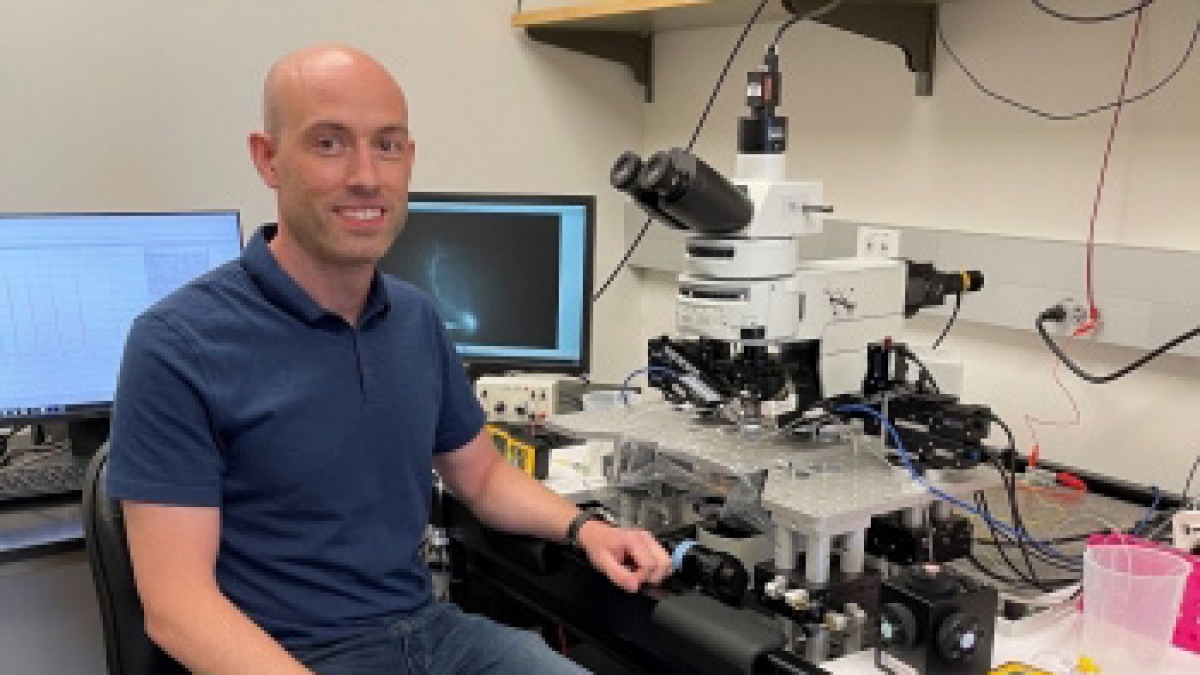ASU faculty member receives Hearing Health Foundation grant

Assistant Professor Timothy Balmer's lab studies hearing and balance disorders like Meniere's disease to discover new possible treatments.
The Hearing Health Foundation has named Arizona State University's School of Life Sciences Assistant Professor Timothy Balmer as a recipient of its 2022 Emerging Research Grants for his research regarding hearing and balance disorders.
Balmer’s lab prioritizes disorders like Meniere’s disease, an ear condition that causes imbalance and vertigo. This disorder may also cause tinnitus, a hearing condition that causes a ringing or buzzing noise in the ear. Suffering from tinnitus himself, Balmer’s research for hearing disorders is personal to him.
Balmer’s lab studies the vestibular cerebellum, a sensory system in the brain integrating signals that convey head, body and eye movements to coordinate balance. When an individual suffers from a condition like Meniere’s disease, the neural processing of this system is disrupted. As a result, vertigo and imbalance occurs.
Parts of the cerebellum are not yet fully understood by researchers, making it difficult to properly treat vestibular disorders. To better understand the physiology and circuitry of the vestibular system, Balmer’s lab studies a cell type in the cerebellum called the unipolar brush cell. These neurons have yet to be fully understood. However, if Balmer’s lab can successfully research their functions, it will help scientists be able to identify causes of vestibular disorders and suggest possible treatments.
“I hope that our research will identify avenues to help those that suffer from vestibular disorders such as Meniere’s disease,” Balmer said. “Anyone who has had problems with their vestibular system will tell you how awful vertigo can be and how important vestibular functions are to our well-being.”
Balmer is a returning recipient of this grant. In 2017, Balmer was generously funded by a donation from the Les Paul Foundation. This continued funding will help purchase the required equipment for research.
Approximately 50 million Americans currently suffer from some form of hearing loss.
The Hearing Health Foundation is the largest nonprofit funder in the United States for research regarding hearing and balance. Since 1958, the organization has made numerous breakthroughs in this field of research. Their mission is “to prevent and cure hearing loss and tinnitus through groundbreaking research and to promote hearing health.” The foundation funds researchers who study the development of hearing loss, methods for treatment, possible prevention and ultimately a cure.
The Emerging Research Grants funded by the Hearing Health Foundation provide support to individuals actively working on esteemed hearing and balance research. The Emerging Research Grants program is competitive and grants funds to researchers who are likely to have the most rewarding success in their work. The program is led by the Council of Scientific Trustees, a group of scientists throughout the country that evaluate the applicants and determine their contributions in this field.
“Receiving this funding will help us purchase the equipment necessary to perform our research,” Balmer said. “But perhaps more importantly, receiving the approval of the group of established scientists that the HHF organizes to judge the merits of the research proposals supports the notion that our lab’s research goals are worth pursuing.”
More Science and technology

Stuck at the airport and we love it #not
Airports don’t bring out the best in people.Ten years ago, Ashwin Rajadesingan was traveling and had that thought. Today, he is…

ASU in position to accelerate collaboration between space, semiconductor industries
More than 200 academic, business and government leaders in the space industry converged in Tempe March 19–20 for the third annual…

A spectacular celestial event: Nova explosion in Northern Crown constellation expected within 18 months
Within the next year to 18 months, stargazers around the world will witness a dazzling celestial event as a “new” star appears in…

